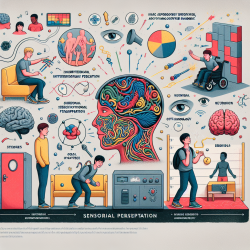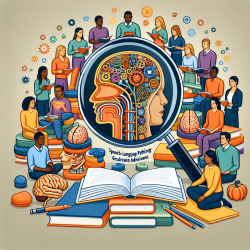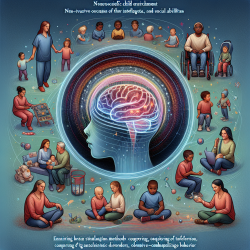Introduction
Autism Spectrum Disorder (ASD) is a complex neurodevelopmental condition characterized by challenges in social communication and the presence of restricted, repetitive behaviors. A significant body of research has highlighted the role of atypical sensory processing in ASD, which can significantly impact social functioning. The research article titled "The impact of atypical sensory processing on social impairments in autism spectrum disorder" provides a comprehensive review of how sensory deficits across multiple modalities could influence social functions in individuals with ASD.
Key Findings from the Research
The research outlines several critical points:
- Sensory Dysregulation: Sensory dysregulation is evident early in ASD and affects social functioning. This dysregulation can manifest in various sensory modalities, including vision, hearing, touch, olfaction, and gustation.
- Neurobiological Evidence: There are neural differences in anatomy, function, and connectivity in regions underlying sensory and social processing in individuals with ASD.
- Mechanisms of Impact: Early sensory dysregulation can cascade into social deficits, emphasizing the need for early intervention to address these sensory challenges.
Practical Implications for Practitioners
For practitioners working with children with ASD, understanding the interplay between sensory processing and social impairments is crucial. Here are some strategies to enhance outcomes:
- Individualized Sensory Profiles: Develop individualized sensory profiles for each child to tailor interventions that address specific sensory sensitivities and preferences.
- Early Intervention: Implement early intervention programs that focus on sensory integration to mitigate the cascading effects of sensory dysregulation on social development.
- Multidisciplinary Approach: Collaborate with occupational therapists, speech-language pathologists, and other professionals to create a comprehensive intervention plan that addresses both sensory and social challenges.
Encouraging Further Research
While the research provides valuable insights, there is a need for further exploration to clarify the mechanisms through which sensory processing abnormalities impact social functioning in ASD. Practitioners are encouraged to stay informed about the latest research developments and consider participating in studies that aim to deepen our understanding of these complex interactions.
To read the original research paper, please follow this link: The impact of atypical sensory processing on social impairments in autism spectrum disorder.










